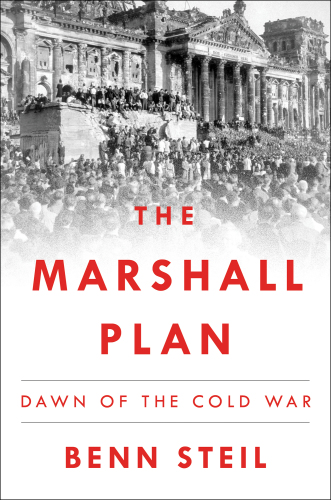
The Marshall Plan
Dawn of the Cold War
کتاب های مرتبط
- اطلاعات
- نقد و بررسی
- دیدگاه کاربران
نقد و بررسی

September 1, 2017
The senior Fellow and director of international economics at the Council on Foreign Relations and an award-winning author taking his expertise beyond the academic market, Steil shows how tightly the Marshall Plan was bound up with the Cold War's inception as he chronicles the chilling of postwar U.S.-Soviet relations, from events like the Prague coup and the Berlin blockade to the creation of NATO and the European Union.
Copyright 2017 Library Journal, LLC Used with permission.

December 18, 2017
In this accessible work of political and economic history, Steil (The Battle of Bretton Woods), director of international economics at the Council on Foreign Relations, comprehensively details the conception, planning, implementation, impact, and contemporary reverberations of the Marshall Plan. Steil places the massive and unprecedented European reconstruction program at the center of the emerging Cold War, delineating how it intertwined with many of the early crises of the conflict. The book makes clear that the Marshall Plan was more than simply an aid program; it effectively constituted the creation of a new Western-oriented political, economic, and military architecture in Western Europe. The plan inevitably drew the ire of the U.S.S.R., which attempted to undermine the project. Steil emphasizes the roles and personalities of leading U.S. statesmen driving the effort to enact the Marshall Plan and devotes considerable space to describing the domestic U.S. political scene and the “legislative drama” behind the plan’s political passage. The Marshall Plan achieved the goals of its creators, he concludes, and while it played a role in drawing the lines of the Cold War, the conflict itself was inevitable. Steil’s fresh perspective on a well-tilled subject will be appreciated by specialists for its wide-ranging analysis and welcomed by general readers for its engrossing style and accessibility. Agent: Andrew Wylie, Wylie Agency.

Starred review from December 15, 2017
A fresh perspective on the Marshall Plan, bringing "new material from American, Russian, German, and Czech sources."From 1948 to 1952, the United States gave Western European nations more than $13 billion to rebuild after World War II. Though scholars have covered the subject many times before, general readers will do well to choose this lively, astute account from Steil (The Battle of Bretton Woods, John Maynard Keynes, Harry Dexter White, and the Making of a New World Order, 2014), the director of international economics at the Council on Foreign Relations. Everyone understood the physical destruction, but many failed to realize how, in the words of the State Department's Will Clayton, "economic dislocation, nationalization of industries, drastic land reform, severance of long-standing commercial ties, and disappearance of private commercial firms were paralyzing recovery two years after Germany's surrender. President Harry Truman and his advisers knew that they needed help. Secretary of State George Marshall tested the waters in his iconic June 1947 Harvard speech; though the American media barely noticed, it thrilled Europe. To everyone's relief, the Soviet Union refused to participate and forced its eager satellites to withdraw. To persuade a war-weary electorate and Republican-controlled Congress to support massive foreign aid required political skills which--at least in that far-off era--our leaders possessed. A national PR campaign portrayed it as an emergency measure to fight communism, and several influential Republican congressmen fought for passage. Steil casts an expert eye on the results and concludes that it succeeded, if not as dramatically as popular writers often claim. On the downside, including Germany infuriated the Soviets but did not, despite revisionist claims, start the Cold War. The author also includes a 25-page cast of characters and four appendices.Political history is often a tough slog, but Steil writes a vivid, opinionated narrative full of colorful characters, dramatic scenarios, villains, and genuine heroes, and the good guys won. It will be the definitive account for years to come.
COPYRIGHT(2017) Kirkus Reviews, ALL RIGHTS RESERVED.

























دیدگاه کاربران